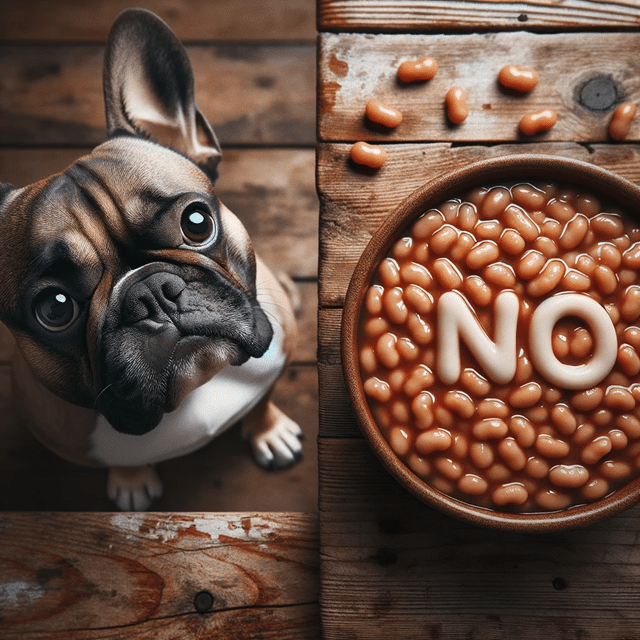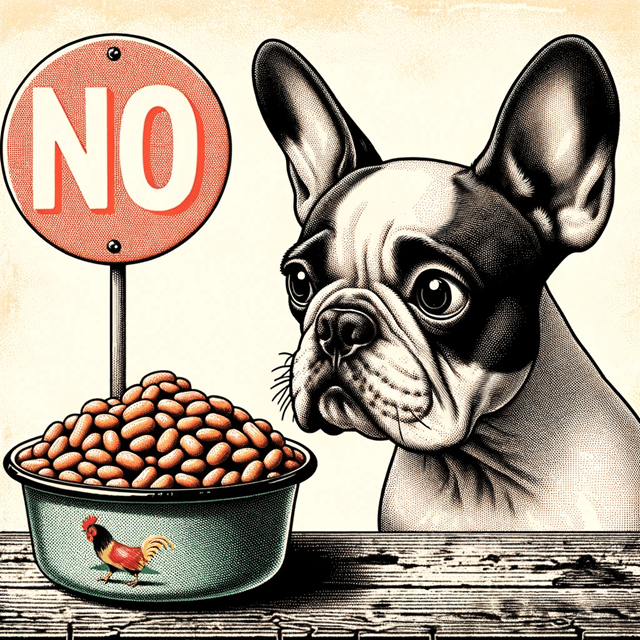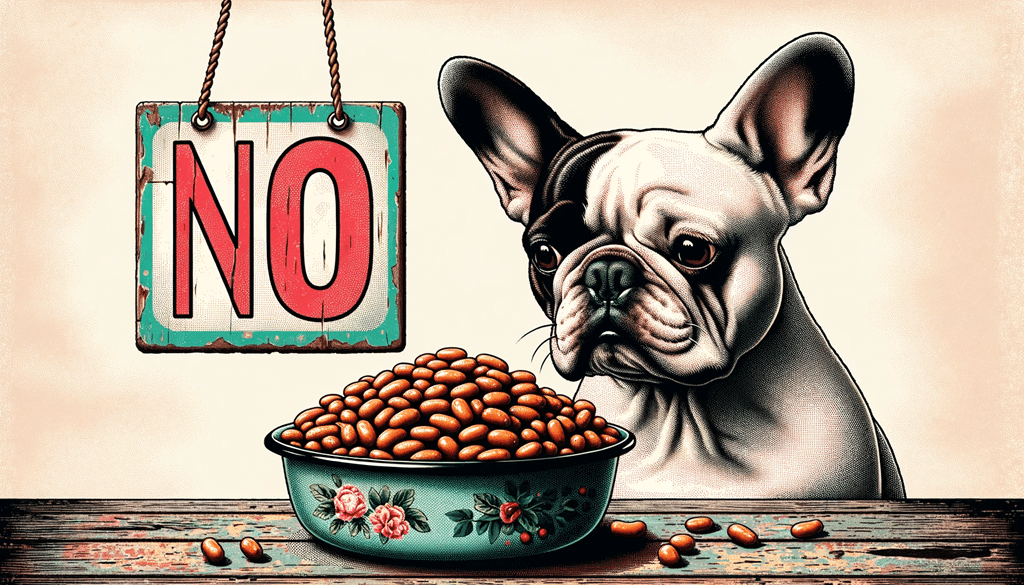Can My French Bulldog Eat Baked Beans: No the should not!!. You’re wondering, can your French Bulldog eat baked beans? It’s a question that’s probably crossed many pet owners’ minds. After all, who doesn’t love a good plate of baked beans? But can your furry friend share this treat? We’ll dive into the nutritional benefits and potential risks of beans, gathering expert opinions and exploring other food options for your Bulldog. It’s important to understand what’s best for your pet’s health and diet. Let’s get started!
Understanding French Bulldog Dietary Needs
To properly care for your French Bulldog, you’ll need to understand their specific dietary needs. This breed requires special attention when it comes to nutrition, often referred to as Breed Specific Nutrition. Due to their unique physique and metabolism, French Bulldogs require a diet that’s tailored to their breed to keep them healthy and energetic.
Your Frenchie’s diet should be rich in protein, as they are naturally muscular dogs. High-quality animal protein sources like chicken, beef, or fish are ideal. They also need a good balance of fruits and vegetables for essential vitamins and minerals. However, it’s not just about what they eat, but how much they eat. Weight Management is a crucial part of their diet. These little buddies have a tendency to gain weight quickly if overfed, leading to obesity and related health issues. Therefore, monitoring portions and ensuring regular exercise is equally important.
Now, let’s talk about Allergy Considerations. French Bulldogs are prone to certain food allergies. Common triggers include wheat, corn, soy, and dairy products. If your dog shows signs of allergies like itching, redness, or digestive issues, it’s time to reconsider their diet. Try to stick with hypoallergenic foods or those made with limited ingredients.
Nutritional Composition of Baked Beans
Now, let’s delve into the nutritional composition of baked beans, a food you might be considering for your Frenchie’s diet. Made from bean varieties like navy beans or haricot beans, baked beans are typically slow-cooked in a sauce, often tomato-based. The cooking methods can vary, but this slow process allows the beans to absorb the flavors while maintaining their nutritional value.
Baked beans are rich in protein, an essential nutrient for your pooch’s muscle development and energy. They also contain dietary fiber that aids in digestion. The iron in baked beans helps maintain healthy blood, and the potassium is beneficial for heart health.
However, it’s essential to note that baked beans for human consumption often contain ingredients that are harmful to dogs. Here’s a quick list:
- Sugar: Excessive sugar can lead to obesity and diabetes in dogs.
- Salt: Too much salt can cause salt poisoning, leading to severe health issues.
- Onion and Garlic: These are toxic to dogs and can cause anemia.
- Artificial Preservatives: Can cause allergies and other health problems.
Baked beans are nourishing and tasty, but the additives make them unfit for your Frenchie’s diet. If you’re keen on feeding beans to your pet, consider other bean varieties and cooking methods. You can prepare a simple, dog-friendly version at home using plain beans and dog-safe vegetables. Always remember, moderation is key when introducing new foods to your pet’s diet.

Potential Health Benefits for French Bulldogs
Despite the potential risks associated with baked beans, your Frenchie can still reap numerous health benefits from bean consumption when prepared appropriately. Beans are packed with fiber and protein, which can aid in digestion and promote muscle growth. This can be particularly beneficial if your bulldog partakes in regular Bulldog Exercise Routines. However, it’s crucial to feed them a well-balanced diet, and not to rely solely on beans for their nutritional needs.
When investigating Canine Allergies, beans can be a safe addition to your dog’s diet. They’re typically non-allergenic, which means they’re unlikely to trigger allergic reactions. That said, every dog is unique, and what works for one might not work for another. Always monitor your Frenchie after introducing a new food to their diet.
By providing your Frenchie with a varied, balanced diet, you’re also supporting their overall health. This includes their skin and coat health, which is a crucial part of Grooming Essentials. Beans contain several nutrients like zinc and vitamin E that can help keep your dog’s skin healthy and fur shiny.
Here’s a simplified table of the potential benefits:
| Benefit | Explanation |
|---|---|
| Aids in Digestion | Beans are high in fiber, which can help regulate your dog’s digestive system. |
| Non-Allergenic | Beans are typically safe for dogs with allergies. Always monitor your dog when introducing new foods. |
| Promotes Healthy Skin and Coat | Beans contain nutrients that can contribute to your dog’s skin and coat health. |
Possible Risks and Side Effects
While baked beans can offer some benefits, you must also consider potential risks and side effects when feeding them to your Frenchie. Foremost among these are digestive complications, allergic reactions, and unhealthy weight gain.
Digestive complications may arise due to the high fiber content in baked beans. While fiber is generally good for dogs, excessive amounts can cause bloating, gas, or diarrhea in your Frenchie.
Allergic reactions are another potential concern. While it’s rare, dogs can be allergic to some of the ingredients in baked beans. Signs of an allergic reaction may include itching, swelling, or difficulty breathing. If you notice these symptoms after feeding your Frenchie baked beans, consult your vet immediately.
Unhealthy weight gain is a risk because baked beans are calorie-dense. French Bulldogs are prone to obesity, and regularly feeding them high-calorie foods like baked beans can contribute to unhealthy weight gain.
The ingredients in baked beans can also pose risks. Some baked beans contain ingredients such as:
- Sugar: Can contribute to obesity and dental problems.
- Salt: High levels can lead to dehydration and high blood pressure.
- Onion and garlic: These are toxic to dogs and can cause anemia.
- Preservatives: These can have long-term health impacts on dogs.
Expert Opinions on Canine Diets
In light of these potential risks, you might be wondering what experts say about including baked beans in your Frenchie’s diet. The consensus among veterinary nutritionists is that while baked beans aren’t inherently bad for dogs, they shouldn’t make up a significant part of their diet due to the high sugar and salt content, which can contribute to dog obesity.
Many experts promote grain-free diets for dogs, arguing that they’re closer to a dog’s natural diet. Grain-free diets are believed to be easier for dogs to digest, leading to less bloating and better overall health. However, it’s important to note that this doesn’t mean your Frenchie should be consuming human foods like baked beans regularly.
Raw food benefits are also a hot topic among experts. Advocates claim that raw diets, which often include meats, fruits, and vegetables, can lead to shinier coats, healthier skin, and higher energy levels. However, these diets require careful planning to ensure they’re nutritionally balanced.
Here’s a quick table summarizing these points:
| Topic | Pro | Con |
|---|---|---|
| Baked Beans | Occasional treat | High in sugar and salt, can contribute to dog obesity |
| Grain-Free Diets | May be easier for dogs to digest | May lack certain nutrients if not properly balanced |
| Raw Food Diets | Potential for shinier coats, healthier skin, and more energy | Requires careful planning to ensure nutritional balance |
Alternate Food Options for French Bulldogs
Given the complexity of canine nutrition, you might be considering alternate food options for your French Bulldog that better cater to their dietary needs. It’s not uncommon for French Bulldogs to have specific dietary restrictions due to Bulldog Allergies, which can be exacerbated by certain foods. Moreover, maintaining a healthy weight is paramount for this breed, making Weight Management a crucial part of their diet.
One of the best ways to tackle these concerns is to explore alternate protein sources. Traditional dog foods often contain proteins like chicken or beef, which can be problematic for dogs with allergies. Instead, consider these alternatives:
- Fish: A great source of omega-3 fatty acids, which is beneficial for skin and coat health.
- Venison: A novel protein source that’s less likely to trigger allergic reactions.
- Duck: Another uncommon protein that can be easier on a dog’s stomach.
- Kangaroo: Despite being less common, it’s a lean protein source that can be beneficial for weight management.
Aside from protein sources, incorporating a variety of vegetables and fruits can provide your French Bulldog with essential vitamins and minerals. However, always remember to consult with your vet before making significant changes to your dog’s diet. They can provide guidance tailored to your dog’s specific needs, ensuring a balanced and healthy diet that supports their overall wellbeing.

Frequently Asked Questions
What Other Human Foods Are Safe for French Bulldogs to Eat?”
You’re keen on understanding your French Bulldog’s dietary restrictions, and that’s fantastic! They can safely enjoy many human foods as healthy snacks. Fruits like apples, bananas, and watermelon are great. Cooked, lean meats like chicken are also good for meeting their nutritional needs. However, remember to avoid anything toxic to dogs, such as grapes, chocolate, and onions. Always introduce new foods slowly to ensure they don’t upset your pup’s stomach.
Can French Bulldogs Be Allergic to Baked Beans?”
You’re wondering if your French Bulldog can be allergic to baked beans. While beans nutrition can be beneficial, they might cause allergy symptoms in some dogs. Watch out for signs like itching, swelling, or digestive issues. To prevent potential allergies, introduce new foods gradually and observe their reaction. If symptoms persist, consult with your vet. Remember, each dog is unique, so what works for one may not work for another.
How Often Can I Feed My French Bulldog Baked Beans?”
You shouldn’t feed your French Bulldog baked beans often. Even with proper bean preparation methods, baked beans can impact digestion due to their high fiber content. It’s essential to practice portion control if you choose to give beans, maybe as an occasional treat rather than a staple. Always monitor your pet’s response and consult your vet if you’re unsure. Remember, your dog’s health should always be your priority.
Are There Any Specific Brands of Baked Beans That Are Better for My French Bulldog?”
You’re seeking a specific brand of baked beans for your French Bulldog. There isn’t a specific brand that’s better, but focus on bean ingredients. Some brands contain less sugar and salt, which is beneficial. Portion control is essential, too many beans may upset their stomach. Consider alternative snacks like carrots or apples, they’re healthier and safer for your pup. Always consult with your vet before introducing new foods into their diet.
What Are the Signs That My French Bulldog Has Eaten Something Harmful?”
If your French Bulldog starts acting like a drama queen, it’s time to pay attention. If they’re vomiting more than a teenager on a roller coaster or showing less interest in food than a supermodel during fashion week, it’s a red flag. Behavioral changes, like sudden laziness or hyperactivity, can also be a sign they’ve eaten something harmful. Don’t ignore these signs, they’re your pooch’s way of telling you they’re not feeling their best.
Conclusion
Navigating your French Bulldog’s diet can sometimes feel like navigating a culinary minefield. However, the consensus is clear: while baked beans offer a tasty treat, they can cause digestive issues and aren’t nutritionally ideal. Like a well-balanced meal, your Frenchie’s diet should be full of diverse, nutrient-rich foods. Consult your vet for personalized advice and remember, when it comes to your four-legged friend’s health, it’s better to be safe than sorry.


